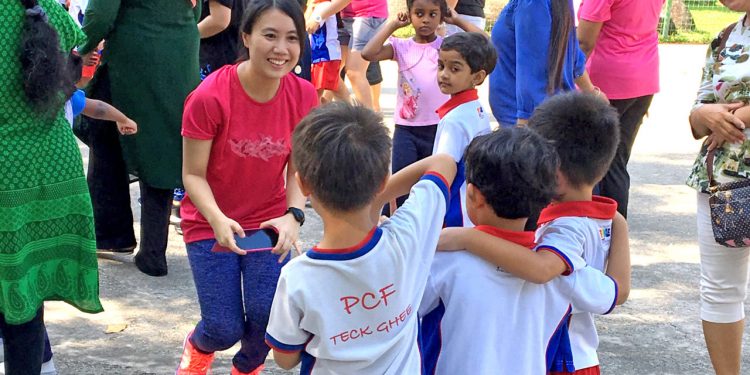Photo caption: ‘Say cheese!’ Teacher Ms Chong Ling Xuan and her students on a day out with students’ families.
This is a post by NTUC Assistant Director-General Ang Hin Kee. Any extracts should be attributed back to the author.
A mother I met in Ang Mo Kio told me she was jealous of a new woman in her boy’s life. The boy could not stop talking about her and kept waxing lyrical about the fun they had together. Apparently, she was ‘jealous’ of the close relationship her son had built up with his kindergarten teacher. This is a good testament to the teacher’s passion and love for the child under her care.
This teacher is one of the 17,000 educators in the Early Childhood (EC) sector. What makes for a great EC Educator? Well, beyond certifiable skills, they have a deep passion for working with young children, great patience and loads of creativity. The positive impact such a person has on the lives of her young charges is tremendous.
However, when EC educators face challenges at work, the opposite is true too. Frequent turnover of staff at a pre-school can be disruptive for a child who is trying to adapt to a new environment outside of home, while learning to trust an adult who is not a family member. At the Education Services Union, we have seen cases where educators became disillusioned by negative experiences. The sudden closure of centres due to poor management has also disrupted the lives of children, parents and teachers.
How do we make conditions right for our EC educators to have a stable and rewarding career, and for the EC sector to flourish?
First, one of the toughest jobs is to match the right employer with the right employee. There are now more career and progression pathways, and unified training and standards for EC educators, to attract, develop and retain them. However, if we go further upstream, it would be mightily useful if we could improve and enhance the selection process. To this, I mean how a job entrant seeks out the employer and vice versa.
I hear of many parents checking out pre-school centres for their kids, assessing the dynamics, observing the teacher-child interactions, and watching the adaptation experience before settling down on their centre of choice. I think we can do likewise for our teachers.
That’s why we at the Labour Movement decided to embark on curating programmes that can help to make that happen. For instance, a customised career trial programme can help job seekers who are keen to join the EC sector gain valuable experience and get a taste of what the work entails through a short-term in-depth exposure. At the end of the trial, the job seeker can decide whether to stay on. Similarly, the preschool operator can assess whether the candidate is a good fit. New entrants will also be put through structured training and conversion programmes to acquire competencies and knowledge. I am happy that we will be rolling out such an initiative to assist our job seekers. More details to come tomorrow.
Another area which we should do more in is to raise the standards of the pre-school operators. Operators who do not keep up with the standards could become a weak link. When lapses occur at the senior management or owners’ level, there is an especially high price to pay, and distressing consequences.
When operators behave badly, EC educators will be at risk of losing their job. The Ministry of Manpower (MOM) punishes errant operators when employment disputes arise, but closer cooperation between the MOM and ECDA – for instance taking into account poor HR practices in ECDA’s license application or renewals – will more effectively rein in such operators and deter poor practices from the onset. Anyone, especially the key account holder, must not have prior poor records in terms of managing staff issues. Perhaps pre-school operators should also be required to make regular contributions to a “deposit insurance” fund overseen by ECDA. The money can be disbursed to affected workers if operators go bust suddenly.
Finally, let’s not forget the crucial role parents play in a child’s development. With dual-income families, it will be useful to look at how we can encourage and further strengthen parent-teacher relations. Some operators try to do so through regular parental chat and pre-enrolment sessions. I know of parents who are kept updated on their child’s performance and school activities in Whatsapp group chats with the teacher and fellow parents.
When visiting a kindergarten in Hong Kong last year, I was struck to see parents attending classes organised by the centre as a pre-requisite for their child’s enrolment. The strong culture of parent-teacher partnership is definitely something we should adopt to empower parents with early years knowledge, so that they can be actively involved in their child’s development at home and from young.
Perhaps then, we would hear all our children recounting stories of happy times they spent together with teachers, some ‘jealous’ mothers notwithstanding. 🙂

